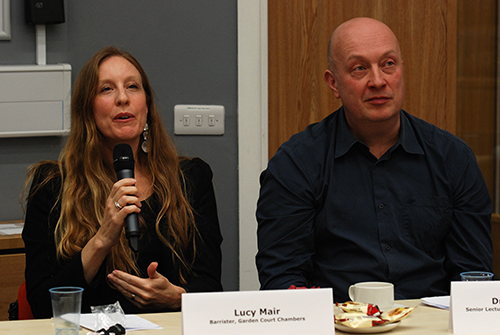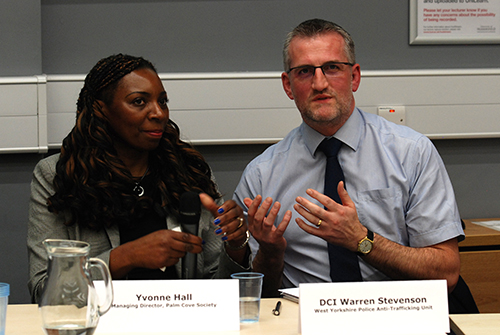Modern slavery forum questions the effectiveness of the NRM

Wed, 12 Apr 2017 13:10:00 BST
“…the panel agreed that the National Referral Mechanism was not fit for purpose due to nationwide inconsistencies in the way victims are reported…”
THE UK’s National Referral Mechanism is a framework to identify victims of human trafficking and modern slavery to ensure they get the appropriate support. However, it is failing across the country according to a panel of experts at the University of Huddersfield’s 2017 Social Justice Lecture.
 The topic for this year’s lecture, organised by the Law School, centred around modern slavery and human trafficking, which has been subject to new legislation since the introduction of the Modern Slavery Act 2015, plus concerted action by police and other agencies.
The topic for this year’s lecture, organised by the Law School, centred around modern slavery and human trafficking, which has been subject to new legislation since the introduction of the Modern Slavery Act 2015, plus concerted action by police and other agencies.
The event’s keynote speaker was Mark Burns-Williamson (pictured right), West Yorkshire’s Police Crime and Commissioner. He outlined the establishment of the National Anti-Trafficking and Modern Slavery Network, which he created in February 2016, and the growing importance of a multi-disciplinary approach to investigation and enforcement.
Mr Burns-Williamson was welcomed by the University’s Deputy Vice-Chancellor, Professor Tim Thornton, who also introduced the panel of experts to the large audience. They were Yvonne Hall, Founder and Managing Director of the charity Palm Cove Society, the University’s Dr John Lever, human rights barrister Lucy Mair of Garden Court North Chambers and West Yorkshire Police’s DCI Warren Stevenson, who led a unit specialising in modern slavery investigations.
 ◄ Panellists barrister Lucy Mair and the University's Dr John Lever
◄ Panellists barrister Lucy Mair and the University's Dr John Lever
The debate began with the panel agreeing that the National Referral Mechanism (NRM) was not fit for purpose due to nationwide inconsistencies in the way victims are reported.
DCI Stevenson noted various failings, one being that the trafficking unit he co-ordinated can offer support to a victim within hours whereas an NRM first responder can take up to five days.
Lucy Mair, who has worked in the field of human rights for over a decade, condemned the current system because it can often lead to the further criminalisation of victims.
“Although the West Yorkshire Police are known as being real leaders in their ability to identify victims of modern slavery, this isn’t the case with many other police forces,” she said.
“When police officers raid a cannabis farm, they don’t necessarily see the young and malnourished Vietnamese teenagers as being potential victims of modern slavery. Instead, they see them as illegal over-stayers. Time and time again victims aren’t being recognised as victims and often criminal charges are brought against them.”
She added that not having correct regulated immigrant status is a criminal offence. “But if you’re an immigrant, you won’t have this if your trafficker procured a visa through deception.”
 ► Palm Cove Society MD Yvonne Hall and West Yorkshire Police's DCI Warren Stevenson
► Palm Cove Society MD Yvonne Hall and West Yorkshire Police's DCI Warren Stevenson
Concerns were also raised about a growing trend amongst the public for demonising irregular migrants rather than suspecting modern slavery and contacting the police. Dr John Lever said he would even go as far to say that modern slavery was becoming normalised. “We have to ask ourselves what kind of society do we want to live in?”
The topic of education was approached and the question of ‘what age should we teach our children about human trafficking and modern slavery?’ was asked.
DCI Stevenson offered that the arts could play an important part in teaching the today’s children about serious issues, such as human trafficking and added he would welcome any support from people in the arts who would like to develop an educational programme.
Ms Hall ended the debate by asking the audience to look out for key indicators of modern slavery, as many successful outcomes in catching perpetrators, arises from public tip-offs by people either at home or in a work capacity.
“Is there someone on their shoulder watching their every move, their every activity?” she said. “Are they appropriately dressed, do they interact with you? Do they have access to their own bank accounts and identification documents?”







